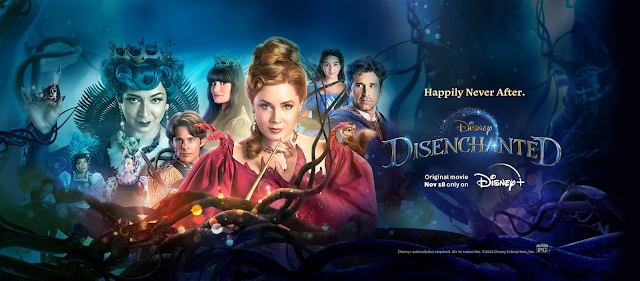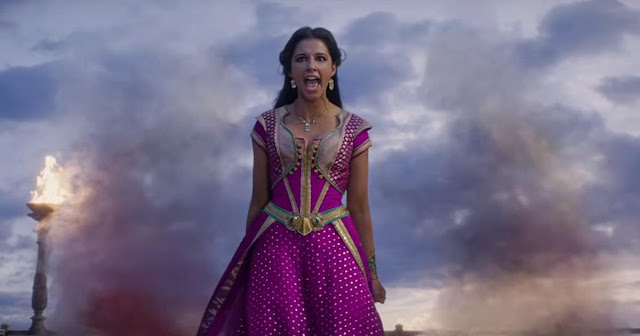Review: Disenchanted
Fifteen years after the premiere of the one-of-a-kind Disney Princess tribute film, Enchanted, Disney has released the next chapter with its latest direct-to-streaming sequel, Disenchanted. While direct-to-streaming is the modern-day equivalent of the direct-to-video sequels of the past, this one could have easily been a theatrical release due to the grand scale of its cinematography that made its thematic direct-to-streaming predecessor Godmothered feel like a cheap imitation. While it may not have been perfect, the plot of Disenchanted is a natural progression of Giselle's life from when the first movie left off with a relatable message for today's audiences, who have a decade and a half more life experience than they did when they saw the original.
Disenchanted has a bit of a rocky start with Giselle's sidekick, Pip, telling his children that more happened after the first movie as though he is trying to convince the audience that it was necessary to make a sequel. Things get more grounded when we return to the real world and see how her family has grown. Giselle and Robert are now married with a newborn baby, and Morgan is a teenager. Like many couples do after they settle down and lose the energy they had in their youth, they decide to move out of the city that never sleeps to the more peaceful suburban town of Monroeville. Since Morgan is now an angsty teenager, she is unhappy about being ripped from her old home and forced to start over in the middle of her high school career. Giselle tries to resolve the situation the only way she knows--by singing. This is one aspect of Giselle's personality that seems to have regressed since the first movie.
In Enchanted, Giselle sang a total of three perfectly curated songs, each one an homage to a different Disney Princess trope that had just the right mix of nostalgia and originality thanks to Alan Menken's genius composing. At the end of the movie, Prince Edward tried to do a duet with her, and she admitted that she no longer felt like singing because she was thinking now, a metaphor that she had acclimated to life in the real world. In this movie, she sang all the time, and often for no particular reason. I went on my phone halfway through the film to confirm that the songs were written by Alan Menken and Stephen Schwartz (the creative mind behind Wicked) because they bore so little resemblance to their usual style. When Giselle used an Andalasian wishing wand to turn the real world into a fairy tale, everyone started singing all the time, and for no particular reason. Though it made more sense after that, I began to finally understand Robert's irritation at Giselle for randomly bursting into song in the first movie.
When this movie does something well, it does it very well. What Disenchanted gets right is its comprehensive analysis of what it means to grow up in a nostalgia-based culture. Giselle grew up in a world of fairy tales. Even though New York City is new and exciting to her at first, she eventually comes to find the real world exhausting, something that many of us experience as we get older. Moving to a suburban paradise seems like the perfect solution, but soon she has the opposite problem. Her life there is so quiet and boring that she clings to the fantasy and magic of her childhood as a form of escapism. Sound familiar? It's this very mindset that has motivated Disney to release so many remakes of their beloved classics over the years. Since we cannot actually erase all of our experiences and return to the carefree days of our childhood, Giselle's spell unleashes a curse that begins to suck all the magic out of Andalasia and erase her memories of innocence, transforming her into a wicked stepmother. Morgan, the new princess of the story, is the only one who can save the day.
I really enjoyed how Disenchanted handled Morgan's character. Instead of aging her up fifteen years, which would make her an adult in her early 20s, they turned her into a headstrong teenager, the same age as a Disney Princess. Where Enchanted was vaguely inspired by "Snow White" with Edward's jealous stepmother trying to kill Giselle using the infamous poisoned apple, this movie papys homage to "Cinderella." Morgan meets a boy she likes and wants to dance with him at a festival that Giselle tries to stop her from attending because of the curse. Giselle even destroys Morgan's pale blue ballgown and locks her in her room before revealing that she only has until midnight to break the curse. Since Morgan wanted her father to marry Giselle specifically because she had been so obsessed with fairy tales and princesses as a child, it is fitting for her to become the new princess heroine. The method that Nancy and Edward provided for her to save Giselle was also fitting, which was using the magic of memories to remind her who she is. This is a fantastic metaphor for how our life experiences can turn us into bitter people when we get older, and nostalgia alone isn't enough to bring out our true selves. We need to remember why the things we loved made us so happy and the bonds we shared with our families who provided those things for us. This movie did a great job of establishing that by showing how Morgan had been welcomed into Giselle's life as her new daughter.
Overall, Disenchanted is a worthy sequel to Enchanted that shows us the evolution of the life of a fairy tale princess entering the real world. In the first movie, Giselle found joy in the excitement of experiencing new things like a young adult living away from home for the first time. In the second movie, she learns the importance of appreciating what she has gained as a result of her choices and not clinging to the past for happiness. Morgan learns the same lesson in a different way by accepting her life in a new town and realizing that we can't stay in the same place forever. This is a terrific family film for any age, but especially for older fans who grew up with the first movie or saw it as a young adult. What are your thoughts on Disenchanted? Let me know in the comments!












Comments